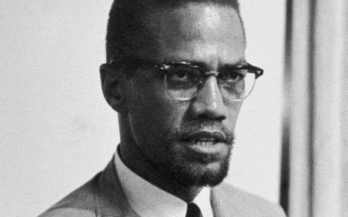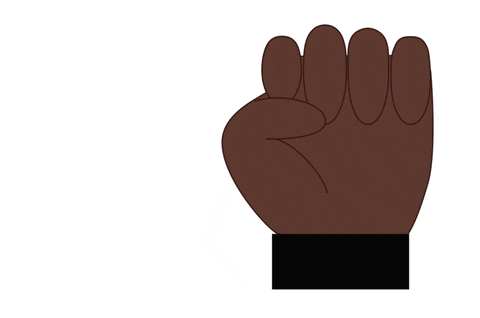the politics of blackness
Introduction
How have the Politics of Blackness evolved? Who were the first Black U.S. Americans to raise their voices? How are their efforts reflected today? "The Politics of Blackness" tries to give an answer to these questions highlighting Black US American people's resistance throughout history. The video and the timeline presented here show the struggle of Black people in the U.S., while considering fragments of speeches that have ushered the most important milestones in US American History.
This video shows the different policies and social movements that have characterised the history of the USA. It reflects on the continuous effort to end segregation and the politics that have supported or hindered these efforts.
1619
First arrival of enslaved people in Jamestown, Virginia

1800-1830
Major slave revolts
Gabriel Prosser's in 1800
Charles Deslondes's in 1811
Denmark Vesey's in 1822
Nat Turner's in 1831
1861 - 1865
U.S.A Civil War
From 1861 to 1865, it was fought between northern states loyal to the Union and southern states that had seceded to form the Confederate States of America. It began primarily as a result of the long-standing controversy over the enslavement of black people.
1865
Abolishment of slavery and involuntary servitude.
1870s - 1965
Jim Crow

1915
D. W. Griffith's film The Birth of a Nation
"Griffith's film was revolutionary in the sense that it practically invented modern cinema in its scope, its action and its use of cameras. It was also extremely racist, morally repugnant and made the Ku Klux Klan heroes."
1950
The Klan has existed in three distinct eras at different points in time during the history of the United States. All three movements have called for the "purification" of American society and all are considered "right-wing extremist" organizations.
It first originated in the 1860s during Reconstruction and died out by the early 1870s
The second Klan started small in Georgia in 1915. Taking inspiration from D. W. Griffith's 1915 silent film The Birth of a Nation, which mythologized the founding of the first Klan, it employed marketing techniques and a popular fraternal organization structure.
The third and current manifestation of the KKK emerged after 1950, in the form of localized and isolated groups that use the KKK name. They have focused on opposition to the civil rights movement, often using violence and murder to suppress activists. It is classified as a hate group by the Anti-Defamation League and the Southern Poverty Law Center.
1964
Malcom X: "The Black Revolution"
“We have to keep in mind at all times that we are not fighting for integration, nor we are fighting for separation. We are fighting for recognition as human beings”

Black Panther Party
The BPP was a Black Power political organization founded by college students Bobby Seale (Chairman) and Huey P. Newton in October 1966 in Oakland, California. Their core practice was its open carry armed citizens' patrols ("copwatching") to monitor the behavior of officers of the Oakland Police Department and challenge police brutality in the city.
1966

1987
Beloved by Toni Morrison
As in the case of Davis, the life of the Afro-American enslaved woman Margaret Garner inspired Morrison to write her work.

2016
13th Amendment Netflix Documentary
"The U.S. is home of 5% of the world population, but 25% of the world prisoners" (13th Introduction). The film presents mass incarceration in the U.S. as the way found to organize society after enslaved people were set free.

Black Resistance in Literature
2013: Americanah by Chimamanda Ngozi Adichie
2017: The Hate U Give by Angie Thomas
2018: Friday Black by Nana Kwame Adjei-Brenyah
2019: I'm Not Dying With You Tonight by Kimberly Jones

2020
Kimberly Jones: "How Can We Win"
"How can you win? You can’t win. The game is fixed. So when they say, “Why do you burn down the community? Why do you burn down your own neighborhood?” It’s not ours. We don’t own anything." (05:04-05:16)
2020
"Fight the Power" by Public Enemy
2020
"The Bigger Picture" by Lil Baby
2020
"Black Parade" by Beyoncé
1776
Independence of the United States of America
1852
Frederick Douglass: "What, to the Slave, is the 4th of July?"
"This Fourth [of] July is yours, not mine. You may rejoice, I must mourn. To drag a man
in fetters into the grand illuminated temple of liberty, and call upon him to join you in
joyous anthems, were inhuman mockery and sacrilegious irony."

1861 - 1877
Reconstruction Era
A turbulent era following the Civil War, which had as aim the reintegration of Southern states from the Confederacy and 4 million newly-freed slaves into the United States.
1868
Equal protection under the law for white and Black people.
1870
It granted African men the right to vote.
1934
W. E. B. Dubois: A Negro Nation Within a Nation
"If the economic and cultural salvation of the American Negro calls for an increase in segregation and prejudice, then that must come"

1963
Martin Luther King, Jr.: "I Have a Dream"
"I have a dream that one day this nation will rise up and live out the true meaning of its creed: We hold these truths to be self-evident, that all men are created equal."
1964
The Civil Rights Act
Against discrimination on the basis of race, color, religion, sex or national origin in the U.S.A.
1981
Angela Davis: "The Legacy of Slavery: Standards for a New Womanhood"
In her speech, she talks about Margaret Garner, “a fugitive slave, who, when trapped near Cincinnati, killed her own daughter and tried to kill herself. She rejoiced that the girl was dead —“now she would never know what a woman suffers as a slave.”—and pleaded to be tried for murder. “I will go singing to the gallows rather than be returned to slavery.” (18)

2013
2016
Nate Parker's film The Birth of a Nation
By using the same title as Griffin's 1915 film, Parker's version stands as a repudiation and rewriting of Black people's history in the U.S.A.

2016
"Chains" by Usher
2020
Response to the killing of Black people: the case of George Floyd, Breonna Taylor, and Ahmaud Arbery
2020
"Just" by Run the Jewels
2020
"Black Lives Matter" by Dax
The material on this page was compiled, created, and arranged by Daniela Diaz. and Virginia Kargachin.






